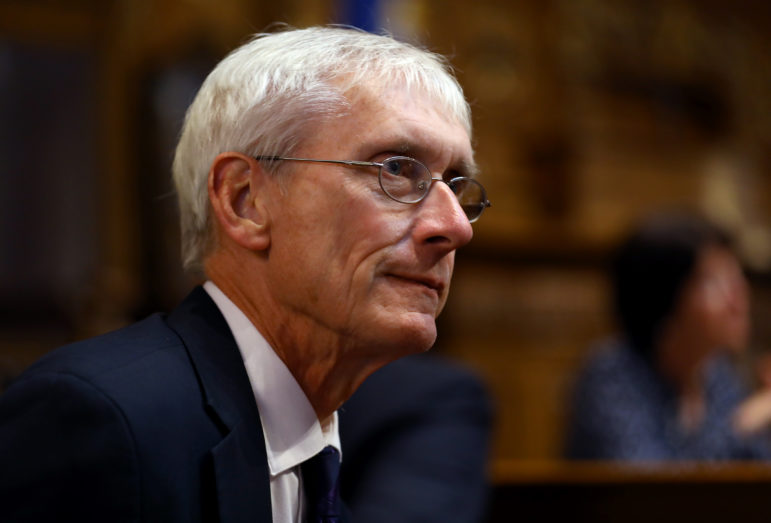Evers Calls for Bipartisan Solutions
Inaugural speech declares state “paralyzed by polarity” and leaders must put “people first.”
In his first speech as governor, Democrat Tony Evers went full olive branch to Republican legislators who must soon pass a state 2019-21 budget the governor can sign or veto.
The 67-year-old former teacher, principal and state school superintendent didn’t indict Republicans for dozens of conservative changes enacted since 2011 or blame them for new limits to his powers passed in December’s “lame duck” session.
But, he said, “We’ve become paralyzed by polarity and we’ve become content with division. We’ve been indifferent to resentment and governing by retribution.”
Evers called for a bipartisan approach to the future:
“This is bigger than me; this is about the people of Wisconsin. It’s about setting aside political interests and personal ambitions to work together on solving problems. It’s about putting people first.”
He said his top three campaign issues — funding K-12 schools, college and universities; making sure more middle-income residents have health care, and fixing the state’ s highway system — got him elected.
“But today is bigger than these issues that we all care about,” he added. “We cannot fix these problems unless people come before politics.”
Evers noted how far he had come since growing up in Plymouth, Wisconsin: he went from “scraping the mold off of cheese to teaching science to becoming state superintendent to now standing here before you.”
Now, he concluded, “we are than the sum of our differences. And what unites is far, far greater than what divides us.”
Evers has already learned that running for governor means compromise. Campaign promises often have to be watered down, delayed or abandoned when you’re governor.
For example, Evers said in a WisconsinEye interview that the “middle class” tax cut that he announced before the election cannot become law until Jan. 1, 2020.
When candidate Evers announced the tax cut, he didn’t mention that it may not help taxpayers until spring 2021 – more than two years after he took office.
And, although Evers campaigned on breaking up the state jobs agency, the Wisconsin Economic Development Corp. (WEDC), he said his first state budget won’t call for replacing it with a new agency that puts more emphasis on regional economic development.
Evers said he’ll live with the “hot mess” — the change in how WEDC is governed approved during the Legislature’s lame-duck session. Lawmakers will have control of WEDC’s board until September.
“We need to get this nine-month thing done,” Evers said.
And, although Evers, Democratic legislators and teachers’ unions have opposed School Choice for decades, the governor-elect said his first budget won’t try to kill it. Instead, Evers said, every homeowner’s property tax bill should show how much Choice costs their local school district.
“We’ve got 30,000-plus kids in [Choice],” Evers said. Killing it “can’t happen – and I’ve never said that it can happen.”
Finally, the highway finding impasse is no closer to being resolved.
Instead, Evers wants Craig Thompson, executive director of the Transportation Development Association, and his choice to be secretary of the state Department of Transportation (DOT), to broker that compromise.
“There’s nobody in the state that knows more about transportation policy, and the options available, than Craig Thompson,” Evers said. “He’s worked on both sides of the aisle.”
But Senate Majority Leader Scott Fitzgerald, who must schedule Thompson’s confirmation vote, said some Republican senators remember that Thompson pushed to raise taxes to pay for highways.
“I have heard serious concerns over [Evers] appointing a provocative figure to head DOT who is a long-time advocate for special interests,” Fitzgerald said.
Evers predicted that the Senate will confirm Thompson. The governor has no plans to name anyone else to run DOT.
Asked about Fitzgerald’s criticism, Evers said, “It’s a new day. We have to kind of set things aside and move forward.”
Steven Walters is a senior producer for the nonprofit public affairs channel WisconsinEye. Contact him at stevenscotwalters@gmail.com
The State of Politics
-
A Wisconsin Political Trivia Quiz
 Dec 15th, 2025 by Steven Walters
Dec 15th, 2025 by Steven Walters
-
The Fight Over Wisconsin’s House Districts
 Dec 8th, 2025 by Steven Walters
Dec 8th, 2025 by Steven Walters
-
The Battle Over On-Line Betting
 Nov 24th, 2025 by Steven Walters
Nov 24th, 2025 by Steven Walters





















